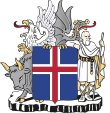
Back العلاقات الخارجية لآيسلندا Arabic Alþjóðatengsl Íslands IS Внешняя политика Исландии Russian Міжнародні відносини Ісландії Ukrainian آئس لینڈ کے خارجہ تعلقات UR
 |
|---|
|
|
Iceland took control of its foreign affairs in 1918 when it became a sovereign country, the Kingdom of Iceland, in a personal union with the King of Denmark. As a fully independent state, Iceland could have joined the League of Nations in 1920, but chose not to do so for cost reasons. It negotiated with Denmark to initially carry out most of its foreign relations, while maintaining full control. Denmark appointed a diplomatic envoy (Ambassador) to Iceland in 1919 and Iceland reciprocated in 1920, opening an embassy in Copenhagen. Iceland established its own Foreign Service in April 1940[1] when Denmark became occupied by Nazi Germany and ties between the two countries were severed. The Republic of Iceland was founded in 1944. The Icelandic foreign service grew slowly in the post-WWII period, but increased rapidly after the mid-1990s. Iceland's closest relations are with the Nordic states, the European Union and the United States.[2] Iceland has been a member of the United Nations since 1946.[1] Iceland was a founding member of the World Bank in 1946 and NATO in 1949.[1] In terms of European integration, Iceland was a founding member of the OEEC (now OECD) in 1948 and the Nordic Council in 1952, it joined EFTA in 1970, was a founding member of the CSCE (now OSCE) in 1973 and the EEA in 1992 and joined Schengen in 1996.[3]
From 1951 to 2006, there was an American military base and troop presence in Iceland.[4] During the Cold War, Iceland had a close but contentious relationship with the United States, leading some scholars to describe Iceland as a "rebellious ally" and "reluctant ally."[2] Iceland repeatedly threatened to leave NATO or cancel the US defence agreement during the Cold War.[2] As a consequence, the United States provided Iceland with extensive economic assistance and diplomatic support.[2] Iceland hosted the historic 1986 Reagan-Gorbachev summit in Reykjavík, which set the stage for the end of the Cold War.
- ^ a b c "80th anniversary of the Icelandic Foreign Service". government.is. Archived from the original on 9 April 2020. Retrieved 9 April 2020.
- ^ a b c d Ingimundarson, Valur (2011). The Rebellious Ally: Iceland, the United States, and the Politics of Empire 1945-2006. Republic of Letters. ISBN 9789089790699.
- ^ History of the Schengen Agreement - Schengen Visa Information
- ^ Petursson, Gustav; Winger, Gregory (24 February 2016). "Return to Keflavik Station". Foreign Affairs. ISSN 0015-7120. Retrieved 24 December 2018.